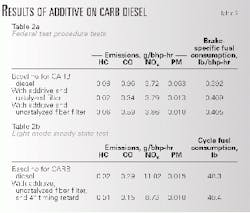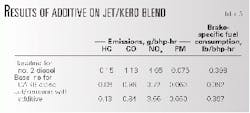Tests show diesel additive reduces emissions
Results of engine-bench tests of its diesel fuel additive showed reductions in toxic emissions that comply with or are lower than CARB (California Air Resources Board) clean air standards, said Clean Diesel Technologies Inc. (CDT), Stamford, Conn.
The additive is a platinum/cerium fuel-borne catalyst called Platinum Plus.
CDT and Southwest Research Institute, San Antonio, jointly evaluated the additive performance in a 1998 heavy-duty diesel engine for a 450 ppm sulfur No. 2 diesel, a 50-ppm sulfur CARB diesel, and a jet-kerosine blend.
Tests for the No. 2 diesel showed that 8 ppm of the additive with an uncatalyzed diesel particulate filter limited particulate emissions to less than 0.02 g/bhp-hr, or 80% below current standards. Although NOx reductions were negligible, the application also reduced hydrocarbon (HC) and carbon monoxide (CO) emissions.
Table 1 compares emission results for the engine using an additive-treated No. 2 diesel with catalyzed and uncatalyzed particulate filters.
Use of the additive with both catalyzed and uncatalyzed filters in the CARB low sulfur diesel resulted in particulate emissions of 0.01 g/bhp-hr, the 2007 limit established by CARB in September 2000. HC and CO emissions also decreased.
Table 2 compares results based on federal test procedures. Except for the steady state tests, fuel consumptions are calculated based on carbon balances.
The table also shows results of an eight-mode steady state test on additive-treated CARB fuel with a 4° timing retard and an uncatalyzed diesel particulate filter. The additive held the fuel economy constant even when the engine timing was changed for 20% NOx reduction.
A blend of a pipeline quality jet-kerosine with 8 ppm of the additive, a commercial detergent, and a lubricity additive resulted in a cleaner burning diesel fuel with lower particulate and NOx emissions than CARB fuel without the additive.
Table 3 compares these federal test procedure results with those of the baseline No. 2 and CARB diesels. In future work, CDT will evaluate this new fuel with diesel particulate filters.
The cost of the additive is 5-10¢/gal. Any distribution point, from the refinery to vehicle saddle tanks, said CDT, can handle adding the additive to its fuel supply. Since early this year, CDT has been selling the additive to fleet and fuel marketers.

